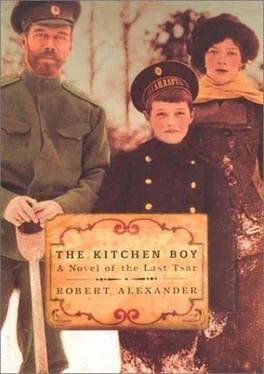And there we were in that fateful house.
“Crammed in like herring in a barrel,” laughed the Tsar one evening.
The Bolsheviki were constantly afraid that the Tsar would try to signal someone on the outside, which is why the windows were painted over with lime and we weren’t allowed to open a single one of them. It was like being surrounded by thick fog. Only the very top pane was left untouched, and through that you could see daylight. As a matter of fact, you could also see a bit of the Church of the Ascension across the square.
“At least we can see the top of the church tower,” the Empress said any number of times. “At least they haven’t taken that away from us.”
What still surprises me most was how well the Tsar and his family coped, how easily they accepted their imprisonment. Maybe Nikolai understood that his fate was to be a martyr tsar. Perhaps. But toward the end, during those last few weeks, he grew terribly depressed, for he saw how much worse things had become. I think he was beginning to realize his mistakes, that all of this could have been avoided if he’d only made a few simple concessions.
And yet they were a kindly family, those royals. During those last months and even last weeks I recall no outbursts among the family members, no screaming or tantrums. There was no fighting, not even among the children. And never once did I hear a raised voice between Nikolai and Aleksandra. No, never. How do I explain this? Nikolai – well, he found his wisdom too late to save his family and the House of Romanov, but all along he was a tender man. Really, I must say he was much too nice to be a Tsar of All the Russias. And Aleksandra – how could such a caring person have alienated so many? How ever you choose to fault Nikolai and Aleksandra – and they had many faults, to be sure – the most honest thing one can say about them was that they had a warm, devoted family. And the truest thing one can say about them was that nothing was more important to them than the well-being of their Mother Russia. That these two things ended in utter disaster is their tragedy, to be sure.
So perhaps in the end that is how they will be judged, on their love of family and country. Yes, perhaps…
Frankly, from the one side that seems as it should be, but on the other it seems too generous, too simplistic, for they lost Russia, and I for one, no matter how badly I feel about what took place, no matter how terrible I feel for what I did, can never forgive them for that. One must understand that they lost her because they never truly realized that Russia was not a seventeenth-century empire, but a twentieth-century industrial power and society, which meant that every step they took to help their country was in fact a misstep. Simply, Nikolai and Aleksandra were desperately out of touch with the modern world, they just couldn’t comprehend that he wasn’t semidivine, they couldn’t separate the problems of their family from those of the country. Perhaps they would have survived if Aleksandra hadn’t meddled so terribly in the affairs of government. And Nikolai, well, he made an enormous mistake by taking control of the armies during the Great War. You see, he went to the front, which in turn left the Tsaritsa in complete control of the government, and then things went to hell in a handbasket, they did. But… but it is always easy to judge, harder yet to comprehend.
So, yes, the notes…
All the rest of that morning I heard nothing more about any plans. It must have been close to noon when cook Kharitonov exploded.
“Radi boga,” for the Lord’s sake, he shouted. “Those idiots have been at it again!”
I hurried in from the hallway. “What is it? What’s happened?”
“Those stupid Reds!” he cursed, though not too loudly. “They come in here and help themselves to anything they want. What pigs! Just look, they’ve eaten all the cutlets we were to have for dinner.”
“Now what will you prepare?”
“I don’t know. There’s nothing… nothing! I’m going to have to request permission for you to go again to the Soviet.”
And with that I shrank away, leaving cook Kharitonov to rant and rave. Wanting to alert the Tsar that I might be sent out of the house, I snuck from the kitchen in search of Botkin. Entering the drawing room, however, it was very quiet, meaning that the Emperor, his four daughters, and the doctor were still outside in the scruffy garden, where today they’d been allowed thirty minutes to pace in the fresh air. But what about Aleksandra Fyodorovna, who so seldomly went out? Not too long ago I’d seen the maid, Demidova, straightening up the dining room, but where was she, the Empress?
I passed from the living room, through the dining room, and directly into the room shared by all four girls, my eyes glancing over the nickel-plated cots they had brought with them from their palace in Tsarskoye. I’d heard Demidova say they were exactly the same kind of camp beds their great-grandfather, Aleksander II, had used in the warring he had done against the Turks, and that’s what they looked like too. Army cots. Each bed was perfectly made by the grand duchesses each morning, yet each bed was slightly different, one with a flowered shawl placed squarely in the middle, another with a red and white Ukrainian coverlet neatly arranged. The metal footboard of each cot was carefully covered with a striped slipcloth, and at the foot of each bed stood a simple chair on the back of which was carefully draped a light blouse. The blouses were identical, I noticed, because the girls so often wore identical clothing. Though their clothes had more than likely come from the fashionable dressmaker, Lamanova of Moscow, nothing they ever wore was very racy, never for a daughter of Aleksandra.
Losing my nerve, I hesitated, for I had not been invited into these rooms. As I stood there, my eyes glanced over their things – next to each cot stood a small bedside table on which sat books and Bibles, an assortment of icons, and a few glass bottles filled with, I assumed, perfumed waters. The orderliness of the room ceased at the walls, however, for on the wall above their beds each great princess had tacked a jumble of mementos, primarily photographs. The snapshots were mostly of their mama and papa, their dogs, a favorite soldier or two, the Livadia Palace – a large white palace overlooking the Crimean Sea, which Anastasiya Nikolaevna had told me was their favorite home – but there was also a handful of sketches and watercolors the girls themselves had done. Sure, the komendant had recently eliminated their favorite pastime, photography, by confiscating the girls’ square, wooden Kodaks, but they were still drawing, and they were all reasonably capable at this.
An attractive electric chandelier hung from the ceiling – it looked like a bouquet of flowers hung upside down, with the blooms fashioned in colored glass. That was where the electric bulbs were, in those glass blooms, and I passed beneath this fixture. Even though I was being extremely bold, even brazen, by entering these rooms uninvited, I pressed on, my feet shuffling across the brown linoleum that covered the floor.
“Aleksandra Fyodorovna?” I called, my voice quivering with nervousness.
This next chamber – their room, where the Emperor, the Empress, and the Heir Tsarevich slept – occupied the front of the house, with two windows facing Voznesensky Prospekt and Ascension Square, and two windows on the side facing the lane. It was a fairly good-sized room, certainly befitting a well-to-do merchant, and it was filled with some polished wooden desks and tables, a wardrobe, a few chairs, one of them soft and upholstered. The walls were covered in pale yellow striped wallpaper, with a frieze of flowers at the top. There was one larger bed, and there to my right-
Читать дальше












